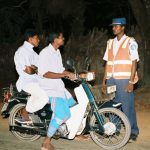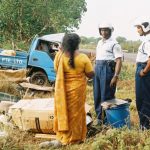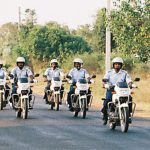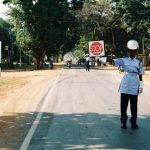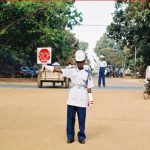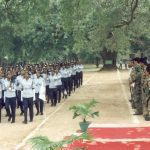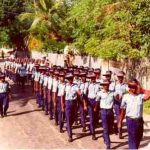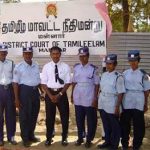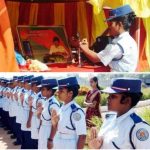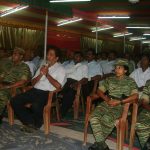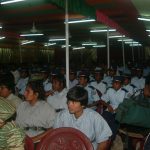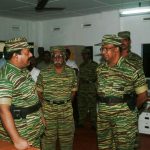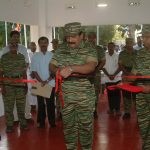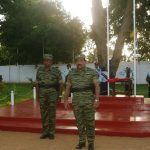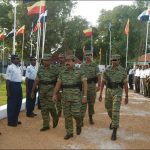

Tamil Eelam Police
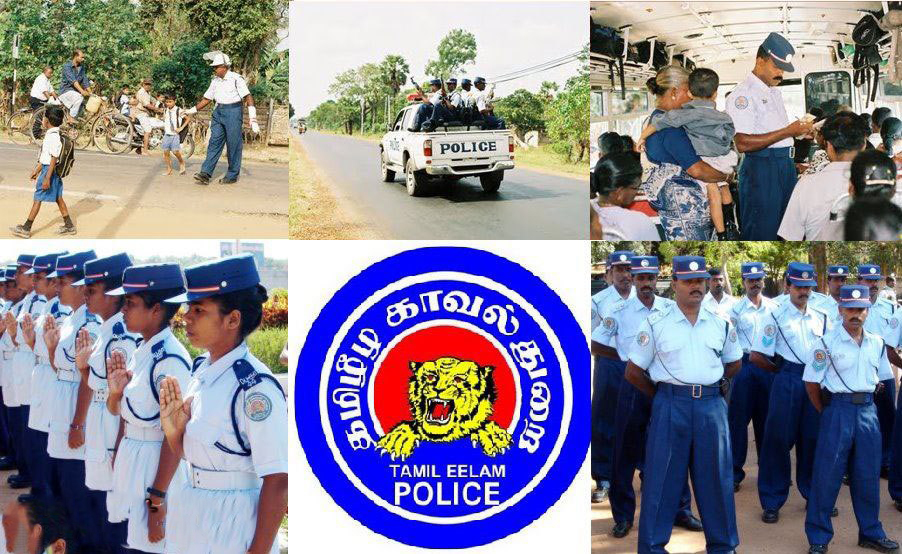
The “Tamil Eelam Police” were founded on 19.11.1991
The “Tamil Eelam Police” were founded on 19.11.1991 with the sole objective of safeguarding the int
Having been established by the national leader of Tamil Eelam, this police force operates under his direct authority / line of command. Commenting on the activities of this force, V. Pirapaharan mentioned,
“The Tamil Eelam Police will be zealous for virtue, honesty, dignity and discipline. With the intent to serve the public they will also function as volunteers who strive for social justice and development. In accordance with our culture, they will engage with the public with character and kindness. They will carry out their duties 24 hours a day with patriotism and will not be associated with any anti-social acts. According to the Tamil Eelam Police, their purpose is not to seek out the criminals and hold them accountable after a crime has been committed but rather to prevent crimes from occurring through the creation of a crime-free society”
Note: – It is noteworthy that the commencement of the Tamil Eelam Police force’s training befell on the 1st of June – the date which commemorates when Sinhala police officers had burnt down Jaffna Public Library.
As the people’s, volunteers…protectors…
Disagreements, conflicts, bitterness, and carnality become human nature in a social environment with diminished resources and growing needs. This is why certain boundaries and regulations become unavoidable necessities in social life. The task of a government’s police is to design such regulations to enforce law and order amidst the public. The practical reality, especially of a nation engaged in a struggle, is more complex. Crimes emerge as laws weaken amidst a circumstance where the public’s natural livelihood is in disarray. << (sentence in Tamil is incomplete)
However, in the case of our Tamil Eelam, the Tamil Eelam Police has been established as a strong institutional force that ensures the natural, peaceful life of the public. This is in accordance with the policy of promoting social and national liberation.
Individuals selected as members for the Tamil Eelam Police commenced their training on 01.06.1991. On 19.11.1991, the national leader of Tamil Eelam, Hon. V. Pirapaharan accepted the force’s honorary parade. He further officially inaugurated the Tamil Eelam Police and established this event as one which must be cemented in the history of our freedom struggle – especially due to its significance for a people who seek to establish an independent state.
Today, stations are gradually being opened across Tamil Eelam in a widespread manner in order to serve the public. The female wing is also experiencing growth on an exponential level. They are also implementing many realms of social reforms and law enforcement within the community which cannot be found in our neighbouring countries of Sri Lanka or India. Their such growth is efficient in successfully attempting to enable the women of Tamil Eelam to lead life as progressive and courageous women.
A few moments with a female sub-inspector of the Tamil Eelam Police, Ms. Ponnaiah.
Q: Can you please elaborate about the role of the female wing in the administration of the police force from the day you completed training in 1991 to this day?
Our teams completed their training on 19.11.1991. The national leader of Tamil Eelam, V. Pirapaharan accepted our first parade and inaugurated our activities. Consequently, stationed were opened across the Jaffna peninsula, including the locations of; Jaffna, Chunnakam, Sangaanai, Kopay, Chavakachcheri, Pallai, Paruttiturai (Point Pedro) and Nagerkoil. Following this, stations were established across the Vanni including the locations of; Kilinochchi, Mullaitivu, Maankulam, Vavuniya and Mannar. We have been working in all of these stations from the day that they were opened ‘til now.
Tasks that we are engaged in across these stations include recording and investigating complaints lodged by the public, regulating cases filed by the police in the courts. We further execute special functions of the police within areas such as the, Criminal Investigation Division. Whilst engaged in intelligence and policing initiatives, we further engage in administrative tasks at the Police Headquarters. In addition to our immense role in crime prevention, we also enforce court orders and arrest warrants released by the courts.
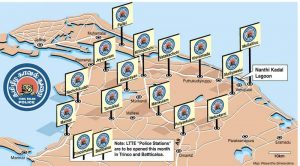
Further, we are also involved in the special tasks of managing; public events, temple festivals and traffic control before schools across each province regardless of whether it is day or night.
Recently, our female officers have been engaged in initiatives across the provinces of; Batticaloa and Trincomalee.
At our stations, we seek and implement compliance between opposing parties with issues such as continuing familial conflicts, exchange conflicts, land disputes and petty quarrels. Our role in regard to this is more so than that of our male counterparts. Whilst investigating and gathering clues in criminal cases, we are also engaged in arresting suspects and filing cases in courts.
Q: In today’s context, which sectors of these stations are women solely responsible for administration?
Due to the current atmosphere of war, the territory within our control is diminishing. As a result, women who were formerly the leads of our stations now undertake divisional and shadow roles across our stations. When we accept responsibilities, all of the members who work there are guided under our line of command. We are also engaged in important tasks such as the streamlining of cases in the courts and investigations at our stations.
Q: Upon what basis are you promoted?
A written examination is conducted for us based on statistics on the depth of our involvement in; the collection of information regarding criminal activities, the detection of cases, the execution of court orders as well the extent of our virtue and discipline within our service period. Those who pass this examination are invited for an interview where promotions are provided only to those who succeed in these interviews as well.
Promotions may also be provided if a police officer engages in the battlefield during times of need or if they are recommended for a promotion by a field commander due to their performance.
Q: Can you please elaborate regarding your increase in ranks?
When recruited as members of the police force, they are recruited in two positions – ordinary members and sub-inspectors. As I had mentioned earlier, those recruited as ordinary members who portray the above-said qualities will be assigned the role of Chief constable upon the basis of such qualities. They will then be further promoted to the ranks of Sub-inspector and Inspector.
Those recruited as Sub-inspectors are promoted to become Inspectors. Our ranking system is still in its developmental stages.
Q: What types of crimes are most prevalent among women?
The following crimes as the most prevalent; abandonment after love, love and impregnation, and sexual intercourse. Thus, women are greatly affected as most women are deceived at a tender age before they are even aware of their own physiology. In recent times, some men have taken advantage of the current circumstances of war and have manipulated it to their favour. A main contributing factor to this is that after committing such crimes, such men often escape into military-controlled territories or they constantly change their locations due to displacements. When attempting to implement legal action against them, such men evade the law by often tricking women who have evidence against them and destroy it.
As a result, it is crucial to raise awareness amongst women to prevent this from occurring.
Q: Have you been faced with any issues when arresting criminals?
As far as Tamil Eelam is concerned, it is very rare for us female officers to face any problems when engaged in the arrest of criminals as we usually arrest women. When we arrest an individual, we clearly explain the charges that have been placed upon them and request their cooperation. Our people are very understanding in this regard. when we engage with those involved in accordance with the above-mentioned approach, they come with us to the station for further investigations. If informed of why certain individuals are required for investigation, the parents, guardians or housemates of those who are to be arrested would often bring those involved to our stations themselves.
Q: What approached do you undertake when dealing with detainees.
All those detained and interrogated in our police station are citizens of Tamil Eelam. They have also been hit hard by many factors such as Sinhala military atrocities and economic sanctions. They are indeed our siblings and thus we engage with them with care and affection.
We are creating a large number of informants amongst the people across all of the villages to retrieve information regarding crimes. In the case of any crime in the villages, they gather information with sufficient evidence and provide it to us. Thus, we view this as a great approach to prevent crime. Through engaging the public as informants, it has become easier for us to conduct inquiries with their assistance. I strongly believe that this system will assist our nation, which is fighting for liberation, to become a crime-free nation in the future.
Q: Every criminal is indeed a representative of the community. In that regard, they may feel inferior or guilty when they are released from detention. What do you do for them?
Our organisation is a sub-organisation of a national movement fighting for liberation. As a result, one of our main responsibilities in the context of the struggle is to direct all individuals who come to the police to become participants in the struggle. We do not have any prejudices when interacting with them during their time of detention. Regarding the people of the police, our members share ideas such as those of social and national liberation, affection and morality with the detainees. << Tamil is unclear
Due to the relationship that we establish with them, the detainees are able to leave without any feelings of guilt or inferiority. Those who are punished as criminals are individuals possess an abundance of qualities and talents to attain many achievements. However, they often err and make mistakes due to the influence of certain circumstances and poverty or due to their attempts to alleviate famine. If they are provided with the appropriate psychological support and training to lift their spirits, they too will become exemplar citizens.
In that regard, one of the main tasks undertaken at the correctional facilities is to provide such training to reform the criminals. It is not impossible for criminals to become virtuous if those without education are educated and if those not interested in employment are taught the importance of hard work, as well as the qualities of self-respect, love for others and patriotism.
Correctional institutes should function as schools. It cannot be claimed that all those outside of these facilities are more disciplined, pure-hearted or without stealth in comparison to the criminals within them. Thus, there is no room for us to think of criminals as individuals who are of the bottom strata of society.
Efforts are being made to implement the above reform policy to the best of our ability and in a more institutionalised manner.
Q: What kind of goal do you want to achieve through these services to Tamil Eelam?
My expectation is that a pristine social structure free from any crime will be formed, when Tamil Eelam attains liberation. It is with this aim that every act is implemented under the guidance of the honourable national leader.
Q: What do you want to say to women in the community as a female police officer?
Today, our struggle is not only for national liberation but also one which incorporates women’s liberation – a historic struggle which is led by the national leader of Tamil Eelam, Hon. V. Pirapaharan. Contemporary women should be proud of this. Having been a target of social oppression and superstitions, the women of Tamil Eelam have awakened and are currently creating many achievements on the battlefronts as well.
However, some women are still afraid to come out in this context and thus they must also become aware and capable of self-guarding themselves. They must also be conscious of legal regulations which are available to allow women to establish justice for themselves or at least attempts to become aware of it through others. It is essential for them to especially be mindful of any evidence that they may have and come forth to hand it over to the courts.
Therefore, I would like to mention that if any woman should deeply deliberate the positive and negative repercussions of their actions, they would be able to protect themselves from becoming subject to any vulnerabilities.
Compilation: –
From the January 2001 Issue of Erimalai.
Click below for full details
![]()
34. Tamileela Kaavalthurai Makkalin Soththu..















